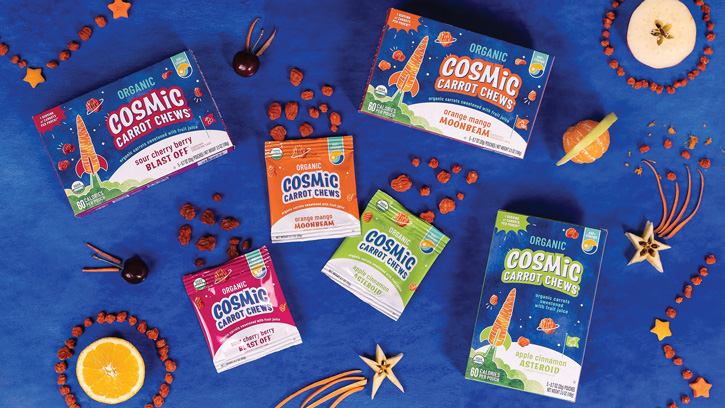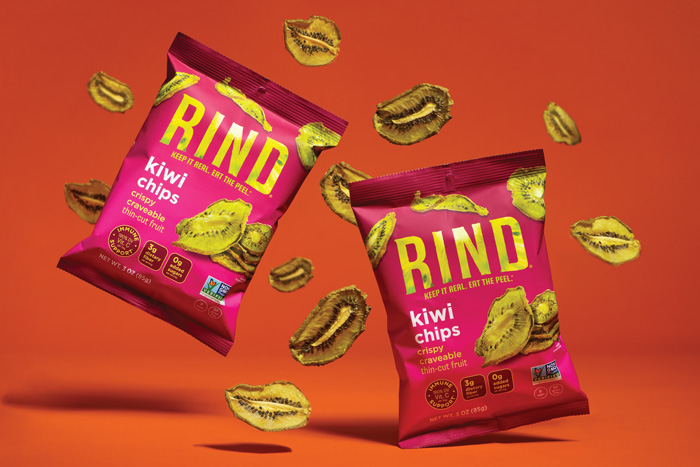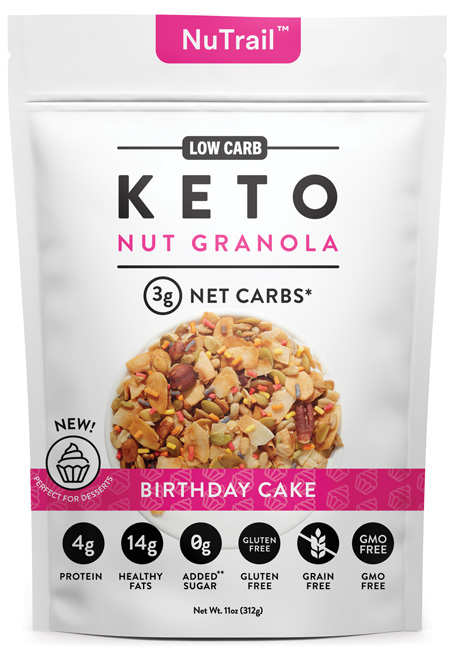Personal, Planetary Health Drive Snack Formulating
Nutraceuticals | APPLIED SCIENCE
I’ve always been a snacker. Right around 10 a.m. and 3 p.m. (and lately 8 p.m.), I get “snacky.” I’m not alone in my snacking habits. According to the International Food Information Council’s 2021 Food & Health Survey, Americans’ favorite snack times are late afternoon (3 p.m. to 5 p.m.) and late evening (8 p.m. to 11 p.m.). In both of these windows, nearly half of survey respondents say they reach for a snack.
Whatever time they snack, more and more consumers are making an effort to choose healthful options. “Consumers are more concerned than ever about their health and are looking to eat more nutritious foods and, in many cases, with smaller portions,” says Marilyn Stieve, senior product manager, Glanbia Nutritionals. “Therefore, the interest and purchase of healthy snacks is one of the leading trends. Within this halo of healthiness, we are seeing strong interest in protein fortification (both dairy and plant) [and] keto-style nutritionals, as well as emphasis on salt and sugar reduction.” Other market drivers include a focus on sustainable snacks and interest in products with immunity-enhancing benefits.
An Upturn in Upcycling
Upcycled foods use ingredients that otherwise would not have gone to human consumption, are procured and produced using verifiable supply chains, and have a positive impact on the environment. According to the Upcycled Food Association, 60% of people want to buy more upcycled food products to help reduce food waste, and companies like RIND Snacks, which makes a line of whole-fruit snacks, are well-positioned to tap into that interest.
The company—which has a tagline of “Keep it real. Eat the peel.”—recently launched RIND Fruit Chips in orange, kiwi, and apple varieties. Keeping the rind on its fruit ensures that RIND Snacks are packed with more fiber and vitamins than traditional dried fruit, and the company fights food waste by diverting edible peels from landfills. RIND’s goal is to eliminate 1 million pounds of fruit waste in 2022 by using upcycled fruits and keeping peels intact.
EverGrain, an ingredient company created by AB InBev, upcycles brewers’ spent barley into nutritious, sustainable protein and fiber ingredients for the food and beverage industry. Earlier this year, EverGrain announced that its entire portfolio of upcycled barley protein and fiber ingredients had received the Upcycled Food Association’s certification. The first-of-its kind mark, which launched last year, will enable food and beverage manufacturers that use the ingredients to place the claim on packaging, highlighting the use of upcycled ingredients.
In February 2022, the Upcycled Food Association received preliminary approval from the U.S. Department of Agriculture’s Food Safety and Inspection Service (FSIS) for the certification mark to be shown on packaging of FSIS-regulated ingredients and products.
In April, PURIS announced that it had earned the Upcycled Certified designation for its Non-GMO and organic native pea starches. The company utilizes all parts of the pea and partners with farmers across the United States to grow its seeds before buying back crops and transforming them into sustainable ingredients. PURIS is one of the first pea ingredient manufacturers to have pea starch that is Upcycled Certified on the market.
Keto Snacks
The high-fat, moderate-protein, and very low-carbohydrate ketogenic or keto diet has impacted the snack market—from bars and baked goods to cookies and chips. Those following the keto diet aim for 75% of calories from fat, 20% from protein, and 5% from carbohydrates.
For keto adherents, foods to avoid include grains, starchy vegetables, high-sugar fruits, sweetened yogurt, juice, honey, syrup, or sugar in any form. Fish, seafood, low-carb vegetables, cheese, avocados, poultry, eggs, nuts, seeds, healthful oils, berries, dark chocolate, and unsweetened coffee and tea are among the permitted products. While it may be hard to imagine how cookies, crackers, and other snacks can fit into a keto diet plan, many such products can be found on store shelves.
HighKey cookies, which are grain free, gluten free, and contain no added sugar, are keto friendly, for example. The company uses a proprietary blend of naturally derived sugar alternatives (erythritol, stevia extract, and monk fruit extract). HighKey Almond Flour Crackers, which are made with almond flour and lupin flour, provide 7 g of protein and 5 g of fiber per serving.
Another keto-friendly snack, NuTrail Keto Nut Granola, contains a mix of pecans, hazelnuts, sunflower seeds, pumpkin seeds, coconut, almonds, butter, whey protein, and monk fruit sweetener. The product boasts just 2 g of net carbs and 0 g of added sugar.
Protein and fat are important as the main sources of energy in a keto diet. Healthful fat sources include olive oil, avocado oil, nuts, and seeds. Protein powders that are low in carbohydrates include whey protein, soy protein isolate, and pea protein isolate. Fish, poultry, and cheese are other protein sources for snack formulations.
Thanks to innovation from ingredient suppliers, snack manufacturers have some new options for boosting the protein content in snack products. Glanbia Nutritionals, for example, has an extruded protein platform, which offers protein ingredients for extruded snacks, in addition to semi-finished extruded protein bites and crisps, which are ideal for bar and snack inclusions. In March, the company launched new milk protein and whey protein solutions for extruded snacks, cereals, and inclusions. Glanbia’s capabilities in extruded protein crisps and bites expanded with the acquisition of PacMoore, which has wide capabilities in extruded snacks and cereals. Extrudable plant-based proteins are in development.
Nuts, particularly almonds, are a good fit as keto snack ingredients, in addition to being nutritious snacks on their own. Recently, Brown et al. (2021) showed that a morning snack of almonds (compared with a common high-carbohydrate option) helped keep blood sugar levels more stable and trimmed the number of calories eaten over the course of the day. In this study of 100 New Zealand adults aged 18–65 years, participants ate either at least 1.5 ounces of unroasted almonds or a calorie-matched sweet biscuit snack. Researchers concluded that replacing less healthy snacks with almonds may help support weight management and help maintain healthy blood glucose levels.
Plant-Based Options
Plant-based snacks are proliferating as plant-based eating continues to gain momentum. Launched earlier this year, Cosmic Carrot Chews from Eat the Change snack company is an example of a plant-based, environmentally friendly, nutritious snack. Carrots are gently cooked, marinated in organic fruit juice and natural flavors, and dehydrated to yield a product with a chewy texture. Cosmic Carrot Chews are nutrient-dense and an excellent source of vitamin A, with each pouch containing one serving of carrots. According to the company, carrots are sustainably produced, as they are a very water-efficient crop. For example, carrots require only 23 gal of water to produce 1 lb versus soybeans, which require 257 gal.
Plant-based proteins are also important for plant-based snacking. In March at Natural Products Expo West, Merit Functional Foods demonstrated its functional Non-GMO pea and canola proteins in a protein bar concept. The plant-based cookie dough protein bar, including the chocolate coating and chunks, was made with Merit’s high-purity Peazazz pea protein and Puratein C canola protein, boosting the nutritional profile to 20 g of protein per serving.
Immunity Boosters
The focus on immunity in foods and beverages has permeated the snack food category. Probiotics are found in coatings on granola and in bars. Vitamin C and zinc are touted in fruit snacks and gummies. And many bar formulations include vitamin D.
A novel whole food vitamin D can help formulate plant-based, clean label, extruded vegetable snacks. PLT Health’s Earthlight Whole Food Vitamin D is a powder produced from mushrooms via a patented process in which the mushrooms are exposed to ultraviolet light to produce vitamin D. Labeled as “mushroom powder” or “mushroom powder vitamin D,” it delivers 1,000 mcg (40,000 IU) of vitamin D per gram of ingredient. Earthlight Whole Food Vitamin D has approval of its Food Additive Petition from the U.S. Food and Drug Administration, paving the way for its use in a broad range of food and beverage products. The approval also covers use of Earthlight in five food categories that until now were not covered in the Code of Federal Regulations for vitamin D fortification: fruit smoothies, soups and soup mixes, vegetable juices, plant-based meat analogues, and extruded vegetable snacks.
Learning Objectives
- Identify trends driving snack development, including interest in upcycling, keto diets, immune health, and plant-based eating.
- Learn about approaches to formulating keto-friendly and plant-based snacks.
- Get an update on ingredients used in formulating healthful snacks.








